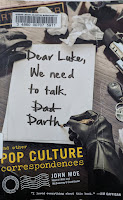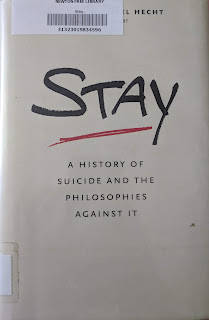September was a good month with about 15 books that I enjoyed. As you can see from the reviews below, I picked up a few more books on exploring racism and the like (and if you're looking for a good resource for recommendations around racism from different perspectives, be sure to check out this post) and two other reviews that I think will be of interest to some readers. Beyond that, there's not much to say about this month's reads but I hope you enjoy them!
So here's the breakdown of the reads for this month:
Check out some of my 2018's books:
Curious about what I've read? Check out the annual good reads list:
Did you enjoy this read? Let me know your thoughts down below or feel free to browse around and check out some of my other posts!. You might also want to keep up to date with my blog by signing up for them via email.
 This work is licensed under a Creative Commons Attribution-ShareAlike 4.0 International License.
This work is licensed under a Creative Commons Attribution-ShareAlike 4.0 International License.
From #BlackLivesMatter To Black Liberation by Keeanga-Yamahtta Taylor
Taylor lays down a nuanced, powerful, and important critique to understanding African-American political and civil movements of the last hundred years. One of her first goals is to contextualize and explain the rise of the Black establishment, Black leaders from post-Civil-War to the present who have bought into the white power structure and while at times, advocate for equity and equality, are just as likely to throw people of color under the bus. Included in this critique is Barack Obama for his often tepid and delay responses to the tragic killings of too many Black lives to list and his disdain for rioters while proclaiming to follow the process (that has repeatedly failed people of color). She uses the construct of the Black establishment to then discuss the rise of a new black radicalism that is consciously intersectional and critique of being absorbed into the Black establishment. Namely, she explores the different strategies, attitudes, and philosophical differences in approach by those involved in the #BlackLivesMatter movement. Overall, I really liked Taylor's means of unpacking what is a very layered and complex dynamic. She's teasing out different threads within something that white culture as a whole (and I as a white male have been equally guilty of doing) has largely viewed as monolithic. The one concern I have with this--and it is certainly not Taylor's to account for--is how such a critique can be used to further undermine the struggle. Taylor's critique does not mess words and in the context of what she's speaking about, they make entire sense. It just worries me how such can then be used by those outside to create or perpetuate increasing division. Regardless, the book is a must-read for anyone trying to further understand the struggles of politically active people of color as they deal with internal and external challenges.America's Original Sin: Racism, White Privilege, and the Bridge to a New America by Jim Wallis
Wallis explores the legacy of racism in American culture through the lens of religion and spirituality, raising biblical arguments and concerns for the ways in which white America has never truly reflected and confronted that legacy. He engages in this discussion on many fronts from the historical intersection of religion and activism to the ways in which certain denominations have perpetuated systematic racism to the degree of segregation that occurs in churches (exploring the truth in Martin Luther King's words that 11am on Sunday is the most segregated hour in America). His tone is welcoming as he engages with scripture, history, law, and culture as means of invoking God's fairness, equality, and equity as missing elements in religious circles that refused to engage in racial dialogue. Wallis's discussion also includes the discussion of immigration and invokes Christians to embrace the stranger; a message that is prominent within the Bible itself. Through his writing, Wallis does more than bring up the different issues, theologies, and arguments to address racism in the US, he also walks the talk by discussing the various inclusive work he has done for decades with different spiritual and political groups to effect change. It's an inspiring work that can help those also grappling with religion and racism to find directions to go. From the time of this reading and review (fall, 2018) Wallis book is, at times, a curious one to read. He predates Colin Kaepernick and the merging of him with the Black Lives Movement as well as the election of Trump (helped by many religious folks; especially Evangelicals) and the embrace of racist and xenophobic viewpoints that come with Trump. Thus, when he predicts that Evangelicals will lead the way to immigration reform, it can feel like such a different time and place given all that has happened since. Regardless, the essential message is a powerful and still relevant one that many Christians should be thinking about.Dear Luke, We Need to Talk, Darth: And Other Pop Culture Correspondences by John Moe
Moe's collection of fictional pieces by fictional characters or ridiculous takes on real-world events is delightful and amusing for those looking to get their pop culture geek on. He tries to hit all corners of the nerd-universe with pieces on alternatives and rejected proposals for SuperBowl half-time shows to the diary of the shark from Jaws to a series of frustrating phone calls between War Horse and his agent to online reviews of different fictional bars (from Cheers to Moe's!). Not all pieces are effective, especially for those who might not be fans of that particular pop culture but when he hits, readers can expect to appreciable laugh. I enjoy the playfulness of a book like this where the author takes the reader on a tour of the pop culture that in some way (just by the fact that he chose these particular icons of pop culture) is relevant or meaningful to him. Additionally, I always find the idea of riffing so enjoyable and curious an act so to see Moe derive new meaning or provide alternative views (e.g. Gilligan was a secret agent until his companions make him increasingly idiotic) from these pop culture artifacts just proves enjoyable from start to finish.Stay: A History of Suicide and the Philosophies Against It by Jennifer Michael Hecht
Hecht's book is a fascinating one and one that certainly resonates with me. Her goal is to provide a historical exploration of suicide and, in part, use that history of numerous writers, institutions, and arguments against suicide to then develop a secular argument against suicide--that is, to stay. There's much to her argument that I appreciate. Firstly, she carves out a particular kind of suicide: one born of depression. This, in itself, I see as important and a distinction from other types of suicides that we can--at times--find more morally acceptable (e.g self-sacrifice). She teases out how great thinkers from Socrates to Locke to Durkheim to Camus to Foucault and does well in bringing much more nuance to the discourse than has been done previously. Building a secular moral argument against suicide, despite a tendency for Western individualism to appear to argue for it, is a tough knot to untie but she does this sufficiently enough for anyone engaged in a discussion to have relevant arguments. What struck personally struck me as most powerful is that the argument around the social responsibility we have should not be undervalued and that our deaths do in fact have many social repercussions from those that we love and love us to how our own individual suicides have the potential to set off a suicide domino effect. As such, committing suicide is indeed immoral. In hindsight of my own bout with suicide ideation from age 10-17 and handful of attempts, what she argues about doing an injustice to your future self resonates strongly. I can understand the power of her arguments but am not entirely sure such a rational and well-argued exploration into suicide will convince someone to stay. (Though readers will walk away with some further ideas on helping others who are grappling with it). If I had one wish for this book, I would have liked to see much more different voices besides Western voices on the subject to flesh it out a bit more in terms of how one might synchronize different cultural conceptions of it.So here's the breakdown of the reads for this month:
AUDIOBOOKS
- On the Other Side of Freedom: The Case for Hope by Deray McKesson
- From #BlackLivesMatter To Black Liberation by Keeanga-Yamahtta Taylor
- All the Pieces Matter: The Inside Story of The Wire by Jonathan Abrams
- Winning the Story Wars: Why Those Who Tell (and Live) the Best Stories Will Rule the Future by Jonah Sachs
- Locked In: The True Causes of Mass Incarceration and How to Achieve Real Reform by John Pfaff
- Dear Luke, We Need to Talk, Darth: And Other Pop Culture Correspondences by John Moe
- The Underground Railroad by Colson Whitehead
- American Cowboy: The Myth and the Reality by Joe Frantz
- America's Original Sin: Racism, White Privilege, and the Bridge to a New America by Jim Wallis
- Stay: A History of Suicide and the Philosophies Against It by Jennifer Michael Hecht
- Krampus: The Yule Lord by Brom
- The End of White Christian America by Robert Jones
- Computing: A Concise History by Paul Ceruzzi
- Things That Make White People Uncomfortable by Michael Bennett
- "Multiplication Is for White People": Raising Expectations for Other People's Children by Lisa Delpit
GRAPHIC NOVELS
- The Walking Dead, Vol. 30: New World Order by Robert Kirkman
Check out some of my 2018's books:
Curious about what I've read? Check out the annual good reads list:
- Books read in 2018
- Books read in 2017
- Books read in 2016
- Books read in 2015
- Books read in 2014
- Books read in 2013
What have been some of your most recent reads of late? What book do you find yourself recommending to everyone? What author(s) can't you get enough of?
Did you enjoy this read? Let me know your thoughts down below or feel free to browse around and check out some of my other posts!. You might also want to keep up to date with my blog by signing up for them via email.
 This work is licensed under a Creative Commons Attribution-ShareAlike 4.0 International License.
This work is licensed under a Creative Commons Attribution-ShareAlike 4.0 International License.


Comments
Post a Comment